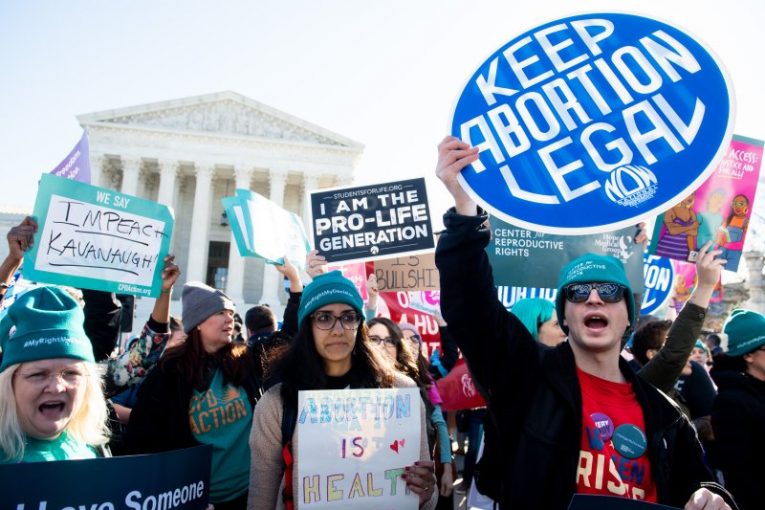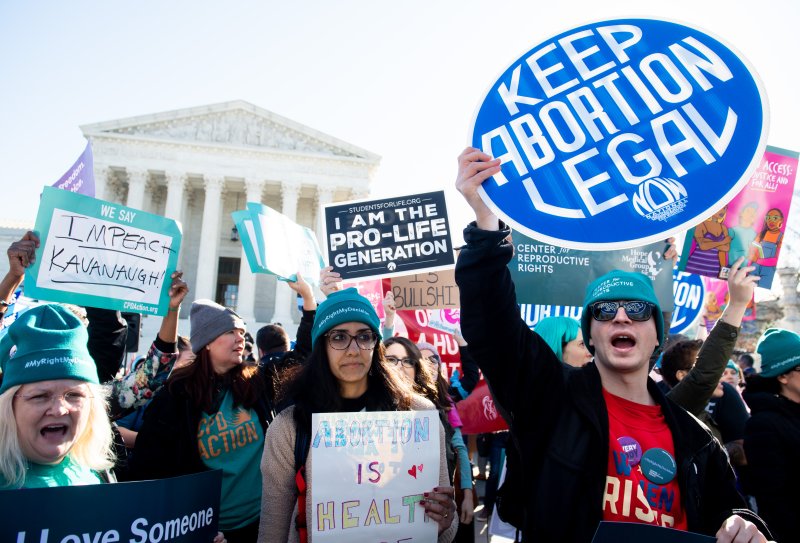

Special to the Vanguard
In the wake of the Supreme Court’s decision to overturn Roe v. Wade, 83 elected prosecutors from around the nation committed to use their well-established discretion and refuse to prosecute those who seek, assist in or provide abortions, calling the criminalization of abortion care “a mockery of justice.” These elected prosecutors—collectively representing nearly 87 million people from 28 states and territories and the District of Columbia, including nearly 27 million from 11 states where abortion is now banned or likely to be banned—argue in a joint statement that using limited criminal justice resources to prosecute personal healthcare decisions runs counter to their obligation to pursue justice and promote public safety.
“Today’s Supreme Court decision is a jarring betrayal of generations of Americans who have come of age with the right to make decisions about their own bodies,” said Miriam Krinsky, Executive Director of Fair and Just Prosecution, the organizer of the statement. “By cruelly and callously stripping away a 50-year-old fundamental right, a majority of the Court has undermined the legitimacy of the criminal legal system and trust in the rule of law. With many states now seeking to criminalize those who seek, perform and receive abortion care, elected prosecutors are the last line of defense in protecting patients and providers from criminal charges. At this frightening and dark moment, we desperately need the bold leadership demonstrated by these signatories – and hope to see far more prosecutors across the country join this chorus.”
Now that Roe v. Wade has been overturned, abortion has been or will soon be banned in at least 26 states. Among the most draconian and dangerous statutes are Texas’ trigger law and an Alabama law under which those who perform an abortion could face life sentences in prison. A recent law in Oklahoma makes it a felony to provide abortions, punishable by up to 10 years in prison, with no exceptions for rape or incest. Bans in Missouri, Tennessee and Utah carry sentences of up to 15 years for providers of abortion care.
“As an elected prosecutor, I took an oath to protect all in my community in the pursuit of justice. Using limited resources to prosecute personal healthcare decisions would be a violation of that promise,” said Bexar County (San Antonio), Texas District Attorney Joe Gonzales. “Outlawing abortion will not end abortion; it will simply end safe abortions and prevent people from seeking the care and help they need for fear of criminal prosecution. I refuse to subject members of my community to that risk.”
The signatories make clear that they approach the issue of abortion from varied personal perspectives but come together in agreement that enforcing abortion bans is a threat to many in their communities: “As elected prosecutors, when we stand in court we have the privilege and obligation to represent the people. All members of our communities are our clients – they elected us to represent them and we are bound to fight for them as we carry out our obligation to pursue justice. Our legislatures may decide to criminalize personal healthcare decisions, but we remain obligated to prosecute only those cases that serve the interests of justice and the people.”
The statement also emphasizes how abortion bans disproportionately harm victims of sexual abuse, rape, incest, human trafficking and domestic violence, and that many anti-abortion laws either do not provide exceptions for victims of sexual violence or force survivors to choose between reporting their assault or carrying an unwanted pregnancy to term.
“Anti-abortion laws endanger the lives and health of marginalized individuals whose access to safe abortion procedures will be restricted the most,” said DeKalb County, Ga. District Attorney Sherry Boston, a signatory to the statement. “Our focus should be on violent offenders and crimes that truly impact public safety and quality of life for the communities we serve.”
“The voters that elected me Michigan’s Attorney General did so knowing I would never place women in the untenable position of having to choose between exercising their personal healthcare decisions and the threat of criminal prosecution,” said Michigan Attorney General Dana Nessel, another signatory to the statement. “I have never wavered in my stance on this issue, and I will not prosecute women or their medical providers for a personal medical decision.”
The full statement and list of signatories is available here. Among the California DAs signing it: Diana Becton (Contra Costa), Chesa Boudin (San Francisco), George Gascón (Los Angeles), Nancy O’Malley (Alameda), and Jeff Rosen (Santa Clara).
JOINT STATEMENT FROM ELECTED PROSECUTORS
We are a group of elected prosecutors representing communities across every region of the country. Over the past few years, we have watched with increasing concern as the constitutional right to abortion has been threatened and eroded. Now, the Supreme Court’s decision to end the federally protected constitutional right to abortion first established five decades ago in Roe v. Wade — a right that three generations of Americans have come of age relying upon — means that abortions will immediately or soon be banned, and potentially criminalized, in at least half of our nation’s states.1 As elected prosecutors, ministers of justice, and leaders in our communities, we cannot stand by and allow members of our community to live in fear of the ramifications of this deeply troubling decision.
Not all of us agree on a personal or moral level on the issue of abortion. But we stand together in our firm belief that prosecutors have a responsibility to refrain from using limited criminal legal system resources to criminalize personal medical decisions. As such, we decline to use our offices’ resources to criminalize reproductive health decisions and commit to exercise our well- settled discretion and refrain from prosecuting those who seek, provide, or support abortions.2
Prosecutors are entrusted with immense discretion. With this discretion comes the obligation to seek justice. And at the heart of the pursuit of justice is the furtherance of policies and practices that protect the well-being and safety of all members of our community.
Prosecutors make decisions every day about how to allocate limited resources and which cases to prosecute. Indeed, our communities have entrusted us to use our best judgment in deciding how and if to leverage the criminal legal system to further the safety and well-being of all, and we are ethically bound to pursue those interests in every case.
Enforcing abortion bans runs counter to the obligations and interests we are sworn to uphold. It will erode trust in the legal system, hinder our ability to hold perpetrators accountable, take resources away from the enforcement of serious crime, and inevitably lead to the retraumatization and criminalization of victims of sexual violence.
Criminalizing abortion will not end abortion; it will simply end safe abortions, forcing the most vulnerable among us — as well as medical providers — to make impossible decisions. Abortion bans will isolate people from the law enforcement, medical, and social resources they need. When individuals know that they or someone they love could be investigated and prosecuted for having an abortion, they are far less likely to call for help in the event of an emergency.
Prosecutors, police, and our medical partners cannot do our jobs when many victims and witnesses of crime or other emergencies are unwilling to work with us for fear that their private medical decisions will be criminalized.
Our criminal legal system is already overburdened. As elected prosecutors, we have a responsibility to ensure that these limited resources are focused on efforts to prevent and address serious crimes, rather than enforcing abortion bans that divide our community, create untenable choices for patients and healthcare providers, and erode trust in the justice system. Enforcing abortion bans would mean taking time, effort, and resources away from the prosecution of the most serious crimes — conduct that truly impacts public safety.
Abortion bans will also disproportionately harm victims of sexual abuse, rape, incest, human trafficking, and domestic violence.3 Over the past several decades, law enforcement has rightly worked to adopt evidence-based, trauma-informed approaches that recognize that not all victims of such crimes are able or willing to immediately report, and that delays in reporting or a reticence to report are consistent with the experience of trauma.4 As prosecutors, we also know that the process of reporting can be retraumatizing for many survivors.5
We are horrified that some states have failed to carve out exceptions for victims of sexual violence and incest in their abortion restrictions; this is unconscionable. And, even where such exceptions do exist, abortion bans still threaten the autonomy, dignity, and safety of survivors, forcing them to choose between reporting their abuse or being connected to their abuser for life. Laws that revictimize and retraumatize victims go against our obligation as prosecutors to protect and seek justice on behalf of all members of our community, including those who are often the most vulnerable and least empowered. Our obligation to exercise our discretion wisely requires us to focus prosecutorial resources on the child molester or rapist, not on prosecuting the victim or the healthcare professionals who provide that victim with needed care and treatment.
Keeping communities safe inherently requires promoting trust and faith in the integrity of the rule of law.6 To best promote public safety, prosecutors must be perceived by their communities as trustworthy, legitimate, and fair — values that would be undermined by the enforcement of laws that criminalize deeply personal decisions, harm those most in need of our help, and force unnecessarily difficult and traumatizing decisions on many in our community.
As elected prosecutors, when we stand in court, we have the privilege and obligation to represent “the people.” All members of our communities are our clients — they elected us to represent them and we are bound to fight for them as we carry out our obligation to pursue justice. Our legislatures may decide to criminalize personal healthcare decisions, but we remain obligated to prosecute only those cases that serve the interests of justice and the people.
Criminalizing and prosecuting individuals who seek or provide abortion care makes a mockery of justice; prosecutors should not be part of that.
